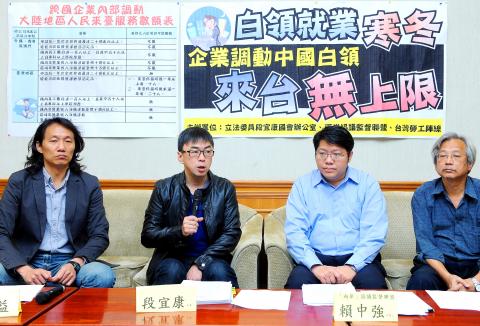|
Chinese workers policy causes concern
By Loa Iok-sin / Staff reporter

Democratic Progressive Party
Legislator Tuan Yi- kang, second left, and members of labor groups talk during a
press conference in the Legislature yesterday. They said that allowing
white-collar workers from China to work in Taiwan will have a heavy impact on
Taiwan’s job market.
Photo: Chu Pei-hsiung, Taipei Times
Worried about the possible impact of the
government’s policy to relax restrictions on Chinese white-collar workers on
employment opportunities and economic development, Democratic Progressive Party
Legislator Tuan Yi-kang (段宜康) and activists yesterday voiced their opposition to
the measure.
According to an announcement by the Ministry of the Interior (MOI) earlier this
month, the government will soon allow companies with their headquarters in Hong
Kong and Macau to relocate white-collar employees from China to their branch
offices in Taiwan, without limits.
The announcement triggered worries from Taiwanese workers.
“Financial institutions are important to a country’s survival. If we allow
white-collar management level employees in banks, we are effectively putting our
financial institutions in the hands of China,” Taiwan Federation of Financial
Unions vice president Lai Wan-chih (賴萬枝) told a press conference at the
Legislative Yuan in Taipei.
“The consequence would be that Taiwan’s financial market would flow to China in
its entirety, and Taiwan would be marginalized,” he added.
Cross-Strait Agreements Watch convener Lai Chung-chiang (賴中強) also expressed
concern about the policy’s impact on employment opportunities for Taiwanese
white-collar workers.
“Current laws stipulate that a Taiwanese multinational firm could hire no more
than 30 white-collar workers from China,” Lai Chung-chiang said.
“It is unbelievable that the MOI’s plan puts no cap on the maximum number of
Chinese white-collar workers from each Hong Kong or Macau-based company. This is
going to take employment opportunities away from Taiwanese white-collar
workers,” he added.
Tuan, on the other hand, was upset that the MOI announced the decision despite a
legislative resolution that asked it to produce an employment impact analysis
before making a decision.
“The executive branch obviously pays no attention to a legislative resolution. I
will definitely hold the MOI responsible for this,” Tuan said.
“I will do everything possible to boycott the plan,” he added.
Tuan also reminded the public of the promise that President Ma Ying-jeou (馬英九)
made during his presidential campaign that he would never allow Chinese
white-collar workers in Taiwan.
“Ma has broken his own promise, and is allowing Chinese white-collar workers to
take the jobs of Taiwanese,” he said.
Defending the ministry’s decision, Deputy Minister of the Interior Hsiao Chia-chi
(蕭家淇) said that the policy is aimed at attracting more foreign direct
investment.
“When a foreign firm plans to make an investment in Taiwan, it would certainly
take into consideration how convenient it is to relocate workers from abroad,”
Hsiao said.
“Some people may think that we can keep jobs if we don’t loosen restrictions up,
but if we don’t open up, there would be less foreign investment, and thus less
job opportunities,” he added.
|
![]()
![]()
![]()